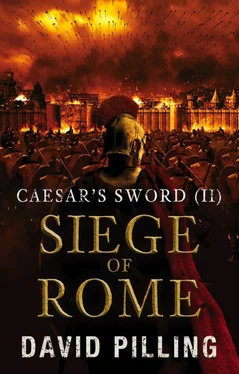David Pilling - Siege of Rome
Здесь есть возможность читать онлайн «David Pilling - Siege of Rome» весь текст электронной книги совершенно бесплатно (целиком полную версию без сокращений). В некоторых случаях можно слушать аудио, скачать через торрент в формате fb2 и присутствует краткое содержание. Год выпуска: 2013, Жанр: Исторические приключения, на английском языке. Описание произведения, (предисловие) а так же отзывы посетителей доступны на портале библиотеки ЛибКат.
- Название:Siege of Rome
- Автор:
- Жанр:
- Год:2013
- ISBN:нет данных
- Рейтинг книги:3 / 5. Голосов: 1
-
Избранное:Добавить в избранное
- Отзывы:
-
Ваша оценка:
- 60
- 1
- 2
- 3
- 4
- 5
Siege of Rome: краткое содержание, описание и аннотация
Предлагаем к чтению аннотацию, описание, краткое содержание или предисловие (зависит от того, что написал сам автор книги «Siege of Rome»). Если вы не нашли необходимую информацию о книге — напишите в комментариях, мы постараемся отыскать её.
Siege of Rome — читать онлайн бесплатно полную книгу (весь текст) целиком
Ниже представлен текст книги, разбитый по страницам. Система сохранения места последней прочитанной страницы, позволяет с удобством читать онлайн бесплатно книгу «Siege of Rome», без необходимости каждый раз заново искать на чём Вы остановились. Поставьте закладку, и сможете в любой момент перейти на страницу, на которой закончили чтение.
Интервал:
Закладка:
“The best, sir,” I replied, swallowing the bile that rose in my throat, “my shoulder is on the mend at last.”
“Shame about your face, though,” he said with a grin. I had forgotten my broken nose, and carefully raised my hand to touch it. The damned thing had set awkwardly. Later, when I had leisure to peer at my reflection in a mirror made of polished metal, I found that my face, never my most attractive feature, now resembled that of an African ape.
“We overheard your conversation with the senators, husband,” said Antonina, “it seems they have found their courage at last.”
“Fools,” he growled, “they want me to arm the citizens and lead them out to face the Goths in the open. Our recent successes have convinced them that Vitiges will take one look at their swords and run away.”
“If the Romans want to fight, let them,” said Bessas, “but without our aid. This city would be a lot easier to defend without the inhabitants whining and snapping at us.”
“Rome emptied of Romans,” said Belisarius, rubbing his chin, “an attractive thought, though it would render our mission rather pointless.”
He turned back to me. “Forgive me, Coel. We are neglecting you. Has my wife informed you of your promotion?”
“The Lady Antonia was good enough to do so, sir,” I said woodenly, deliberately avoiding Antonina’s eye. I knew she was smirking, and longed to do or say something to wipe out her insufferable complacency, “though I hardly think I deserve such an honour. You made me a decanus, and I lost my entire command.”
“That was none of your fault,” said Belisarius, “we lost over six hundred men at the Praenestine Gate. Many officers and men died. Your conduct, however, was exemplary. You fought at the Salarian Gate, in the defence of Hadrian’s mausoleum, and at the Praenestine Gate. Constantine assures me that the Goths would have taken the mausoleum, if you had not thought to use the statuary to repel them.”
Using the statues as missiles had in fact been Ubaz’s idea, but he was no longer alive to claim the credit. I glanced at Constantine. At first I thought my unlooked-for promotion was mainly thanks to him, but then I received praise from an unexpected quarter.
“I saw Coel stand his ground in the last fight,” said Bessas, his craggy face twisted into something like a smile, “even though he was exhausted and nigh-dead on his feet. I have no hesitation in approving his promotion.”
I only stood my ground because I was pinned to the wall by a dead Hun, but it seemed impolitic to say so. God had seen fit to smile on me, which made a pleasant change from what he usually dropped on my head, and so I ate up the honey while it lasted.
18.
The siege wore on into spring. Neither side wished to risk another engagement. We could not afford the casualties, and Vitiges’ already dented prestige might not have survived another defeat. The Goths only respect strength in their kings, and expect them to provide victory after victory in the field. To be repeatedly defeated by a handful of inbred Romans and ill-disciplined Eastern mercenaries, as they perceived us, was an intolerable humiliation.
Vitiges settled down to break our resistance through famine and blockade. He failed, however, to cut off the lines of communication between Rome and the Campanian coast, and in the latter days of April wonderful news arrived: a Roman fleet had arrived at last from Constantinople, carrying a squadron of Hunnish and Sclavonian cavalry.
The troops had embarked at the end of the previous year, but storms had delayed the fleet’s departure and forced it to winter in Greece. They landed on the northern bank of the mouth of the Tiber, guarded by a fortress called the Port of Rome. The fort, along with the fortified town of Ostia on the southern bank, had once guarded the sea-passage into Rome, but the Goths had seized both. Even so, our reinforcements were able to get past the defences and ride along the ancient stone highway, eighteen miles in length, to the gates of the city.
Our elation was short-lived. “Is that all?” exclaimed Procopius as we watched the riders enter the Salarian Gate, “a few hundred light cavalry? There must be more!”
There were sixteen hundred in total, mostly horse-archers. They were a useful addition to our depleted garrison, but the sense of disappointment was palpable. Whether through envy or neglect or sheer poverty of resources, the Emperor had responded to Belisarius’ begging letters by sending a bare minimum of aid.
Procopius, never Justinian’s greatest admirer, was beside himself with rage. “He wants Belisarius to fail,” he snarled, “the flatterers and traitors at court have poured so many lies into him, he can scarcely tell truth from falsehood any more. That evil whore of a wife has corrupted him with every form of degenerate vice. I tell you, Coel, Justinian is not fit to be called Caesar. He is not fit for anything save emptying the dung-pits of his slaves!”
I clapped my hand over his mouth. We were standing in the street just inside the gate, where anyone might hear us, and Procopius had just uttered enough treason to condemn him several times over.
“For God’s sake, mind your tongue,” I whispered, “if Belisarius overheard half of that, he would have no choice but to place you on trial. Do you want to hang?”
“Belisarius would not lay a finger on me,” he sneered, pushing me away, “I know too much, and am far too valuable to him. Besides, I am sure he shares my opinion of our beloved ruler.”
“Has he actually said as much?”
“Not as such, but I know him, Coel. I have been his private secretary for many years, and I can read his thoughts. It wouldn’t take much for…”
His voice trailed away, thank the Lord. Even he baulked at voicing the unspeakable, though I had occasionally heard our men talking of it in low voices when in their cups.
Why were they fighting against desperate odds in the service of a distant Emperor who sent them little help, and who appeared not to care if his soldiers lived or died? Who was their real leader, the man who fought and suffered alongside them, who had led them to one improbable victory after another?
Belisarius, of course. Why could the soldiers not raise a general to the purple, instead of Justinian? It had happened before, many times, during the turbulent years when the Roman Empire tore itself apart. Unlike Justinian, who sat idle in Constantinople and lived in luxury while his people suffered, Belisarius was the very image of a soldier-emperor, in the mould of Hadrian and Trajan and Marcus Aurelius.
My history was patchy, but I seemed to recall that very few emperors whose authority relied on the army lasted very long. Being a learned historian, Procopius was well aware of this, but even he was starting to indulge treasonous thoughts. They would curdle over the years, until his brilliant mind became tragically unhinged, and he wrote a series of disgraceful secret histories damning Justinian and his court in the most lurid and ridiculous terms. The histories were hidden, for once published his life would have been forfeit. I read a few fragments, and am very thankful they remain locked away in some obscure vault. May they never, God willing, see the light of day.
Enraged at the ease with which our reinforcements had slipped past his outposts, Vitiges tightened his grip on Rome. His fleet blockaded the seas, and he made great efforts to cut off all contact between the city and our garrisons in the south. To that end he seized two ruined aqueducts which lay seven miles from Rome, the arches of which covered a substantial part of the country. His workmen turned these ruins into a makeshift fortress, blocking up the gaps with stone and clay, and inside it he placed a garrison of seven thousand men.
Читать дальшеИнтервал:
Закладка:
Похожие книги на «Siege of Rome»
Представляем Вашему вниманию похожие книги на «Siege of Rome» списком для выбора. Мы отобрали схожую по названию и смыслу литературу в надежде предоставить читателям больше вариантов отыскать новые, интересные, ещё непрочитанные произведения.
Обсуждение, отзывы о книге «Siege of Rome» и просто собственные мнения читателей. Оставьте ваши комментарии, напишите, что Вы думаете о произведении, его смысле или главных героях. Укажите что конкретно понравилось, а что нет, и почему Вы так считаете.












